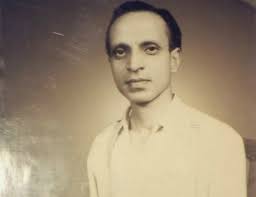 Makhdum Mohiuddin
Makhdum Mohiuddin
(Mak̲h̲dūm Muḥīuddīn)
1908 – 69
 Makhdum Mohiuddin
Makhdum MohiuddinMakhdum Mohiuddin, (Mak̲h̲dūm Muḥīuddīn; 1908-69; also Makhdoom, Mohiyuddeen) was born Abu Sayeed Muhammad Makhdum Mohiuddin (Abū Saīd Muḥammad Mak̲h̲dūm Muḥīuddīn) into a lower-middle class family of clerics in Andole, in Medak District of Telangana, the Princely State of Hyderabad, Deccan. He received his early education and religious training in his village, then went to Osmania University, Hyderabad, for both his B.A. and M.A. in Urdu, receiving the latter in 1932. Reacting strongly to world events, he started writing highly political poetry in 1935. At about the same time he joined the Comrades’ Association, a group representing the Communist Party of India (CPI) in Hyderabad State, which then evolved into the Nizam State Communist Committee in 1939 and then eventually the CPI of Andhra Pradesh.
With the German invasion of the Soviet Union in 1941, he resigned his teaching position and joined the “United Front” effort, becoming a full-time worker in the newly established party in Hyderabad. The first of his two collections of poems, Surkh saverā (Red Dawn; 1944), contains many of his best-known works, notably “Sipāhī” (Soldier),* and “Jang-i āzādī” (War of Freedom).* In 1946 he played an active role in the Telangana agitation, which required him to go underground to avoid arrest. He emerged in Bombay, where he had his initial association with the film industry. In 1951, he was arrested for his political activities during this uprising and jailed by the Nehru government, memorialized in “Qaid” (Imprisonment).* After his release the following year, he stood for election to the Lok Sabha but was defeated. In 1958 he was elected to the National Council of CPI, and during the latter part of his life he served as a member of the legislature of Andhra Pradesh.
His second collection of poems, Gul-i tar (Dew-Tipped Rose) was published in 1966. It contains his notable love poems, such as “Intiz̤ār” (Waiting),* “Cārahgar” (You Who Cure),* and “Āj kī rāt nah jā” (Do Not Leave Tonight).* In 1969 his two volumes of poetry were republished as a single volume, Bisāt-i raqṣ (Dance Carpet), for which he was awarded the Urdu Sahitya Akademi Award. See Remembering Makhdoom, ed. J. Alam (2010); Carlo Coppola, “Makhdum Mohiuddin: The Reluctant Progressive,” Urdu Poetry, 1935-1970: The Progressive Episode (2017) 442-65; and Raza Naeem, “Magnificent Makhdoom,” The Friday Times. 6 Sept. 2019. www.thefridaytimes.com/magnificent-makhdoom/.
1. Āj kī rāt nah jā / Do Not Leave Tonight
3. Āzādī-i vatan / The Country’s Freedom
7. Cānd tāron̲ kā ban / Moon-and-Star Forest
9. Cup nah raho / Don’t Keep Silent
13. Iḥsās kī rāt / Night of Feeling
17. Iqbāl kī raḥlat par / On the Death of Iqbal
21. Jang-i āzādī / War of Freedom
22. Jān-i g̲h̲azal / Embodiment of the Ghazal
24. Lak̲h̲t-i jigar / Piece of the Heart
34. Pyār kī cāndinī / Moonlight of Love
38. Sab kā khvāb / Everyone’s Dream
44. Vadī-i fardā / Tomorrow’s Valley
These poems are taken from: Bisāt̤-i raqṣ (Dance Carpet). Ḥaidarābād, Inḍiyā: Istiqbāliyah kameṭī jashn-i Mak̲h̲dūm, 1966.
Further Reading:
Coppola, Carlo. “Two Voices in the Poetry of Makhdum Mohiyuddin.” Indian Literature. 26:1. 43-68.
__________. “Makhdum Mohiuddin: The Reluctant Progressive.” Urdu Poetry, 1935-1970: The Progressive Episode. Karachi: Oxford UP. 2017. 442-465.
Jafar, Sayyidah. Makhdoom Muhiuddin. New Delhi: Sahitya Akademi. 2002.
Moazzam, Anwar. “Makhdoom: The Evolution of a Poetic Vision.” Indian Literature. 55:3. 2011. 205-15.
See below for an eight-part documentary on Makhdum Mohiuddin.

